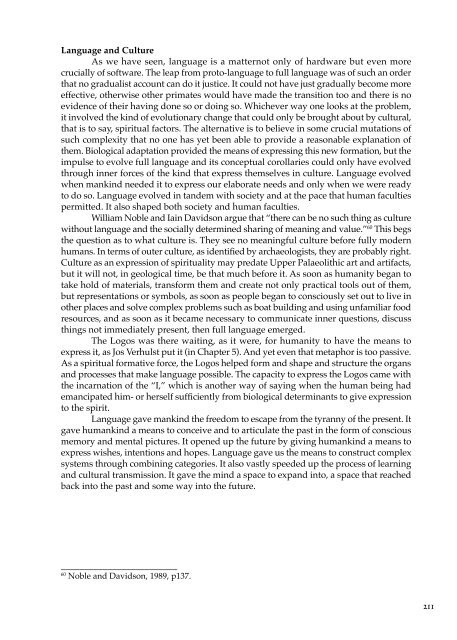The Spirit in Human Evolution - Waldorf Research Institute
The Spirit in Human Evolution - Waldorf Research Institute
The Spirit in Human Evolution - Waldorf Research Institute
Create successful ePaper yourself
Turn your PDF publications into a flip-book with our unique Google optimized e-Paper software.
Language and Culture<br />
As we have seen, language is a matternot only of hardware but even more<br />
crucially of software. <strong>The</strong> leap from proto-language to full language was of such an order<br />
that no gradualist account can do it justice. It could not have just gradually become more<br />
effective, otherwise other primates would have made the transition too and there is no<br />
evidence of their hav<strong>in</strong>g done so or do<strong>in</strong>g so. Whichever way one looks at the problem,<br />
it <strong>in</strong>volved the k<strong>in</strong>d of evolutionary change that could only be brought about by cultural,<br />
that is to say, spiritual factors. <strong>The</strong> alternative is to believe <strong>in</strong> some crucial mutations of<br />
such complexity that no one has yet been able to provide a reasonable explanation of<br />
them. Biological adaptation provided the means of express<strong>in</strong>g this new formation, but the<br />
impulse to evolve full language and its conceptual corollaries could only have evolved<br />
through <strong>in</strong>ner forces of the k<strong>in</strong>d that express themselves <strong>in</strong> culture. Language evolved<br />
when mank<strong>in</strong>d needed it to express our elaborate needs and only when we were ready<br />
to do so. Language evolved <strong>in</strong> tandem with society and at the pace that human faculties<br />
permitted. It also shaped both society and human faculties.<br />
William Noble and Ia<strong>in</strong> Davidson argue that “there can be no such th<strong>in</strong>g as culture<br />
without language and the socially determ<strong>in</strong>ed shar<strong>in</strong>g of mean<strong>in</strong>g and value.” 60 This begs<br />
the question as to what culture is. <strong>The</strong>y see no mean<strong>in</strong>gful culture before fully modern<br />
humans. In terms of outer culture, as identified by archaeologists, they are probably right.<br />
Culture as an expression of spirituality may predate Upper Palaeolithic art and artifacts,<br />
but it will not, <strong>in</strong> geological time, be that much before it. As soon as humanity began to<br />
take hold of materials, transform them and create not only practical tools out of them,<br />
but representations or symbols, as soon as people began to consciously set out to live <strong>in</strong><br />
other places and solve complex problems such as boat build<strong>in</strong>g and us<strong>in</strong>g unfamiliar food<br />
resources, and as soon as it became necessary to communicate <strong>in</strong>ner questions, discuss<br />
th<strong>in</strong>gs not immediately present, then full language emerged.<br />
<strong>The</strong> Logos was there wait<strong>in</strong>g, as it were, for humanity to have the means to<br />
express it, as Jos Verhulst put it (<strong>in</strong> Chapter 5). And yet even that metaphor is too passive.<br />
As a spiritual formative force, the Logos helped form and shape and structure the organs<br />
and processes that make language possible. <strong>The</strong> capacity to express the Logos came with<br />
the <strong>in</strong>carnation of the “I,” which is another way of say<strong>in</strong>g when the human be<strong>in</strong>g had<br />
emancipated him- or herself sufficiently from biological determ<strong>in</strong>ants to give expression<br />
to the spirit.<br />
Language gave mank<strong>in</strong>d the freedom to escape from the tyranny of the present. It<br />
gave humank<strong>in</strong>d a means to conceive and to articulate the past <strong>in</strong> the form of conscious<br />
memory and mental pictures. It opened up the future by giv<strong>in</strong>g humank<strong>in</strong>d a means to<br />
express wishes, <strong>in</strong>tentions and hopes. Language gave us the means to construct complex<br />
systems through comb<strong>in</strong><strong>in</strong>g categories. It also vastly speeded up the process of learn<strong>in</strong>g<br />
and cultural transmission. It gave the m<strong>in</strong>d a space to expand <strong>in</strong>to, a space that reached<br />
back <strong>in</strong>to the past and some way <strong>in</strong>to the future.<br />
_________________________<br />
60<br />
Noble and Davidson, 1989, p137.<br />
211
















